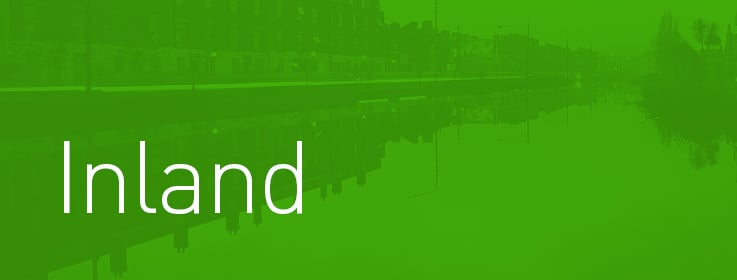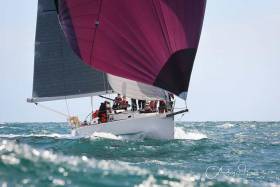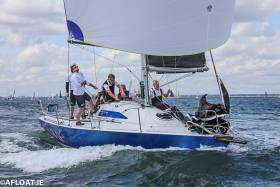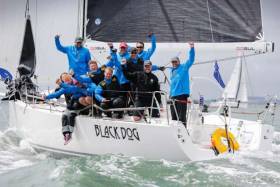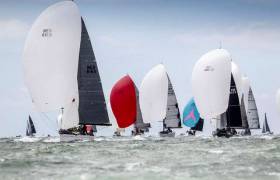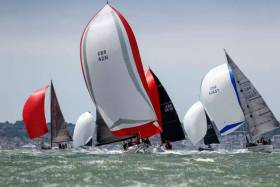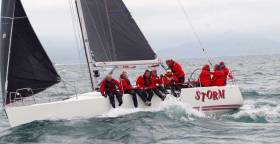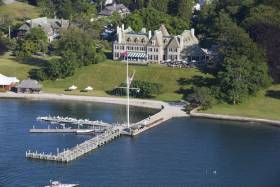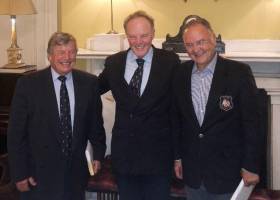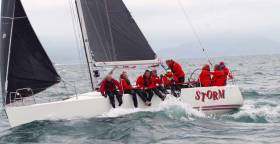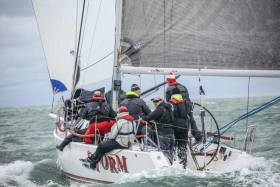Displaying items by tag: IRC
Carrickfergus's 'Spirit of Jacana' is Welsh IRC Class One Champion
Clwb Hwylio Pwllheli Sailing Club in conjunction with the Royal Dee Yacht Club, was once again delighted to have the opportunity to host the Spinlock IRC Welsh National Championships, as part of our 2019 Celtic Regatta, and Welsh leg of the RC35 class Celtic Cup writes Mark Thompson. We welcomed boats from all the Celtic nations, and the event started with a reception in Plas Heli on Thursday evening hosted by the commodore of Pwllheli Sailing club, Jane Butterworth in glorious sunshine on the Plas Helideck.
Race day 1 - with 20 kt winds and showers forecast, the race management team laid a simple windward-leeward course, and racing got underway as scheduled. For the first race the weather held with a steady 20kts of breeze from the south-west giving a choppy sea, but fine racing conditions, allowing our Celtic visitors to put their stamp on the event very early in IRC 1, with First 35 Triple Elf (Christine and Robin Murray) taking first by 3 seconds corrected from J133 Spirit of Jacana (Alan Bruce and James Douglas) with J109 Jings (Robin Young) taking third. It was clear at this early stage that these well-drilled regatta boats were going to dominate IRC 1 and push the top IRC 2 boats for the overall title.
In IRC 2 J97 Injenious (Mike Crompton and Graham Hallsworth) took the first race ahead of 2018 Welsh IRC champion Ian McMillan, sailing Impala Checkmate with Andrew Miles J35 Sidetrack third.
IRC 4 sailed one round the cans race with some close racing, with the win going to Mark Willis in Rodmar, with Alan Barton, Induna just behind.
The second race in IRC 1 and 2 started as scheduled with darkening sky’s to the South West and with most of the fleet on the beat, a very intense squall whipped up, with winds up to 37kts and torrential rain in zero visibility! with many boats reefing down, it was survival mode for a while. After 10 mins the fleet emerged through the other side, and finished the race before heading back to the Plas Heli pontoons, and a welcome pint! Great chat in the bar, with Andy Green's photos on the big screen, and crews claiming ever increasing wind strength as the evening drew on! It was a great day of racing though, which every one enjoyed, and race 2 was won in IRC 1 by Spirit of Jacana, IRC 2 by Injenious.
Daily Prizegiving was sponsored by Partington Marine, with jugs of beer and followed by a Barbeque. During prizegiving the race management team informed the competitors that regrettably racing would be cancelled on the Saturday, due to a deep low with forecast winds of 30-40kts in the race area. This was the same weather system that lead to the first day of Cowes week being abandoned. Our visitors took the opportunity to explore the Llŷn Peninsula and enjoy the live music in Plas Heli, with Jac Dobson a’r band delivering a great early doors set during the late afternoon.
Day 3 dawned brightly with North Westerly winds of 10-15 kts giving flat water and excellent racing conditions, and glorious views of the stunning Llŷn peninsula and Snowdonia. For IRC 1 and 2 four races were held, with up to four laps of a short windward-leeward course. The starts were crucial, and the two RC35 class boats were giving a master class in starting. J125 Jacknife and J133 Spirit of Jacana, both higher rated boats having to push hard to get ahead of the J109 and First 35 from Scotland, and with the short legs not able to take significant advantage downwind, particularly from the boats flying symmetric spinnakers. Great racing though with some interesting interpretation of the racing rules at some of the mark roundings! The results of all four races in both IRC 1 and 2 were again dominated by the Irish and Scottish visiting boats, with Triple Elf able to discard one race due UFD
In IRC 4 the cruisers raced two races around the cans from a bridge start and again the four boats racing today had two great races and were all very closely matched. Scored using NHC, with Induna (Alan Barton) taking race 1 and Rodmar (Mark Willis) race two. This resulted in Rodmar winning this class overall from Induna, with Roger Fitzgerald racing Dehler 29 Ella Trout 3 with his grandchildren third.
The results in IRC 1 and 2 took a little bit of time to clarify with ratings having to be double-checked, but finally, the results could be announced. The daily prize giving was sponsored by Rowlands Marine Electronics, with jugs of beer and glassware presented to day 3’s race winners. The overall prizegiving was sponsored by Firmhelm Marine who donated some great prizes, with MD Simon Butterworth drawing two boat names out of a hat to present Dubarry deck shoes and a gift voucher.
In IRC 1 the overall winner was confirmed as J133 Spirit of Jacana (Alan Bruce and James Douglas) on countback from First 35 Triple Elf (Christine and Robin Murray) with fellow RC35 class member J109 Jings third.
In IRC 2 local boat J97 Injenious (Mike Crompton and Graham Hallsworth) took first ahead of 2018 champion Checkmate (Ian McMillan) with Sidetrack (Andrew Miles) third.
IRC 4 results were as above with Rodmar (Mark Willis) presented with the Royal Dee cruiser class trophy
The overall Spinlock IRC Welsh National Champion was announced as J97 “Injenious” just one point less overall than “Spirit of Jacana”, and presented with the 2019 Spinlock trophy and voucher.
Full results at www.ircwelshchamps.com
Next year's regatta dates as 14-16th August 2020
Irish Boats Prepare for Welsh IRC Championships
With just over two weeks until the Welsh IRC Championships on Cardigan Bay, Irish IRC boats are preparing for the trip across the Irish Sea to the Llŷn Peninsula and to Plas Heli - the Welsh National Sailing Academy on August 9th.
Royal Irish Yacht Club's Patrick Burke will compete in the First Class 35 Prima Luce in IRC as will Dave Cullen's Half Tonner Checkmate XV from Howth Yacht Club.
This year's Irish entries continue a fine reciprocal tradition of competing in Wales where Irish boats have recorded considerable success over the past five years.
The Championships also doubles as the Welsh leg of the RC35 class's Celtic Cup where Howth boat Storm won the inaugural trophy last year. And in 2017, Waterford raiders 'Fools Gold' won the IRC Welsh Championships.
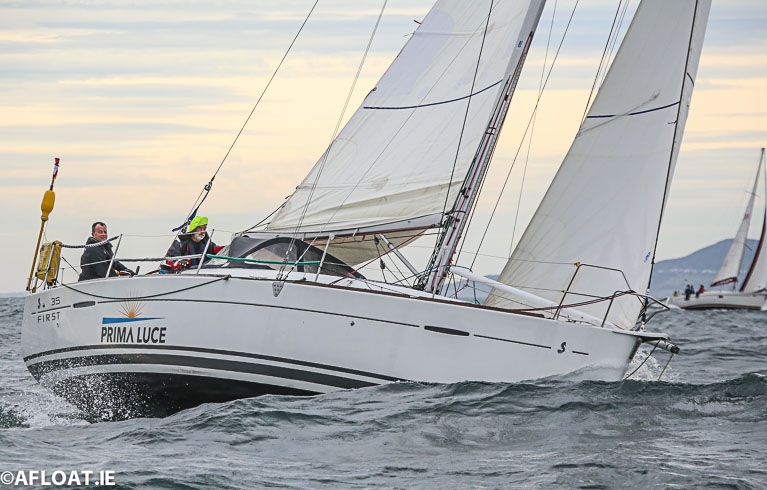 Patrick Burke's First Class 35 Prima Luce from the Royal Irish Yacht Club Photo: Afloat
Patrick Burke's First Class 35 Prima Luce from the Royal Irish Yacht Club Photo: Afloat
Berthing will also be available for Irish boats competing in the ISORA race from Dun Laoghaire to Pwllheli on July 27th and who wish to leave their boat in Pwllheli ready for the IRC Champs.
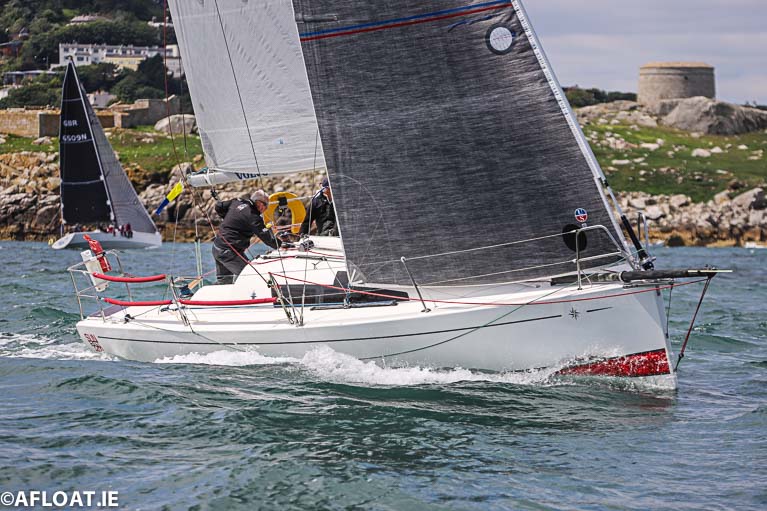 Mark and Jo Thompson's Jac Y Do from Clwb Hwylio Pwllheli Sailing Club Photo: Afloat
Mark and Jo Thompson's Jac Y Do from Clwb Hwylio Pwllheli Sailing Club Photo: Afloat
Pwllheli will also welcome competitors from right across the Irish Sea catchment area including Scotland.
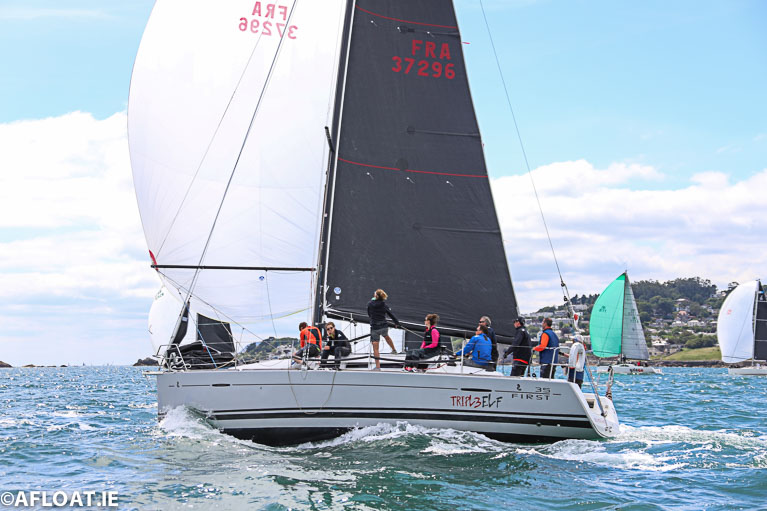 Christine and Robin Murray's Triple Elf Photo: Afloat
Christine and Robin Murray's Triple Elf Photo: Afloat
Christine and Robin Murray's Triple Elf from Fairlie Yacht Club and last year's Class 2 Overall Winner Checkmate (Ian MacMillan) are also entered. This Checkmate team have just become UK Impala National Champions. Also entered is Robin Young's J109 Jings from the Scottish RC35 class.
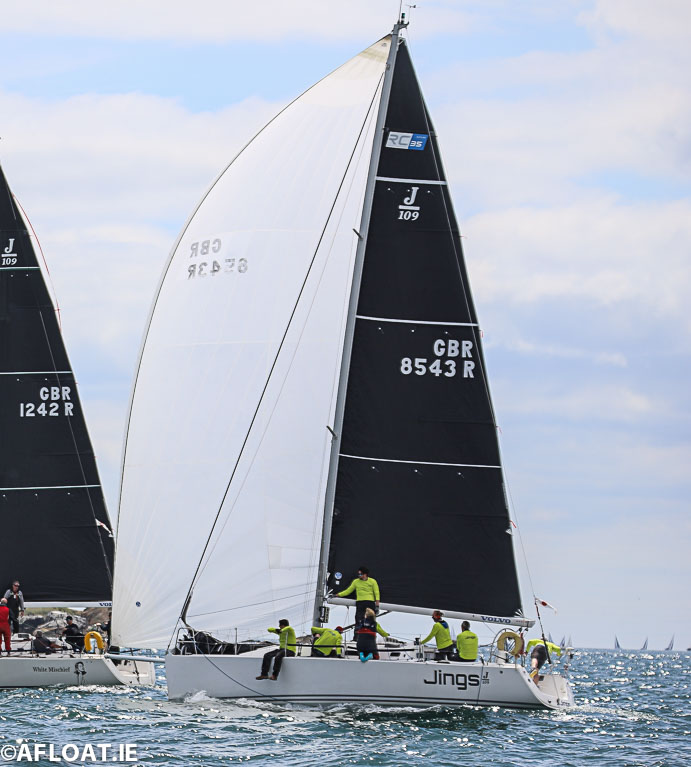 Robin Young's Jings from Clyde Cruising Club Photo: Afloat
Robin Young's Jings from Clyde Cruising Club Photo: Afloat
The bulk of these boats last competed together at Dun Laoghaire Regatta earlier this month.
IRC 1, 2 and sports-boats (IRC3) will race from a committee boat start in Tremadog Bay (Race Officer Mike Butterfield). The cruiser class (IRC4) will start and finish from the PSC club line adjacent to Gimlet Rock (Race Officer Robin Evans)
See entry list here
Howth's Shane Hughes Wins UK IRC 2 Title on 'Black Dog'
The Royal Ocean Racing Club's 2019 IRC National Championship has been won out of the blue by a first timer not from the Solent. The 22 boat IRC Two fleet was led from the outset by Stuart Sawyer's J/122 Black Dog, rounding off the series today with a final bullet to win ultimately by 15 points from the Blair family's King 40 Cobra. As Afloat reported earlier, Dublin sailor Shane Hughes of North Sails Ireland was tactician on the winning entry from Falmouth.
Today was the third in this three-day event where the race committees ventured out into the Solent uncertain of whether they would get racing in. Today it was grey, with sub-10 knot winds and drizzle, and yet two windward-leewards were held on the Hill Head plateau enabling PROs Stuart Childerley and Steve Cole to compete the full schedule on their respective courses.
While the form was firming up in most classes, oddly the opening race saw a new winner in every class, partly caused by a significant shift on the final run. In IRC 1, it was the turn of French owner Dominique Tian on the Ker 46 Tonnerre de Glen to prevail, while in IRC 2 it was Performance 40 season leader Christopher Daniel's J/122E Juno. The IRC 3 (and HP30) bullet went to Malcolm Wootton's modified Farr 30 Pegasus while Jubilee and Whooper were both upstaged in both today's races by the Southworth's Quarter Tonner Protis. Even in the FAST40+ class Tony Dickin's newly acquired Carkeek 40 Mk3 Jubilee managed to break the unbroken string of bullets of Peter Morton's Girls on Film.
Nonetheless, after the mathematics were applied, Black Dog was determined to be the worthy recipient of this year's IRC National Championship title.
"We haven't sailed that much this year, so when we came up we said we'd be aiming for the top five and we'd be delighted by top three in our class. To win overall is incredible!" said Stuart Sawyer, his Black Dog also securing the Performance 40 prize. While the team has been sailing out of Falmouth on several boats for the last nine years, Sawyer admitted that they feel isolated racing in Cornwall. Previously they campaigned their J/111 around the Solent, but coming from Cornwall this proved too difficult so, according to Sawyer, he sold it and bought the J/122 "to take it easy. But then after we won Dartmouth Royal Regatta last year we thought we had to come here to see how we'd do..."
Compared to racing in Falmouth, there was more of a chop than a swell to deal with on the Solent but also the tides were far more complex. For the event the regular crew was assisted by North Sails' Shane Hughes plus a copy of the Winning Tides book. "And you are constantly having to change gears, but my crew has been amazing - I have never seen them hike harder," said Sawyer who also paid tribute to the late J/Boats dealer and Solent racing guru Paul Heys: "The one person who would have loved to have seen this is Paul. He would have been so chuffed to see both a Cornish boat and a J Boat do this."
In IRC 1 all four boats won races, but ultimately it was Tony Langley's highly polished Gladiator crew, including the likes of Iain Percy and Jules Salter, that prevailed. Despite being a prolific TP52 owner, simultaneously campaigning three boats, this was Langley's first IRC Nationals. "I love it - it is nice to come home," he said. "It was good to have some boat-on-boat action with Tala this weekend. We knew we had a bit on because she is a bit faster. They sailed it well." The UK Gladiator was also Langley's first. "I have quite a soft spot for this boat. We have won the Round the Island and Cowes Week and St Tropez last year on her and now this."
The closest competition for Black Dog's overall IRC Nationals win came from David Franks' J/112e Leon. Her otherwise perfect scoreline was broken twice today, by Pegasus and then in race two by Bruce Huber's Xanadoo, one of two sisterships to Leon competing. "He got his boat this year to come on to give us some competition, but now he is starting to bite our neck," observed Franks, who was the IRC National Champion with his previous boat Strait Dealer in 2012.
One of the tightest battles occurred in IRC 4 where Nigel Goodhew's Sun Fast 3200 Cora and defending champion Giovanni Belgrano on Whooper both suffered disappointing days enabling the Southworth-powered Protis to leapfrog them into second overall. However, winning overall by five points with a consistent 2-2 today was Christopher Preston's J/109 Jubilee.
"It was great fun," observed Preston. "We were very pessimistic about whether we'd all be racing at all today, but then the wind came in and the race committee got it going at the right time and we had two very nice, interesting races with the turn of the tide in the second which made it tactically interesting. It was a much better day than we had dared hope."
As to why Jubilee won, Preston attributed it to being "well prepared with a good crew who sail well together. It helps being at the top end of the rating bracket with a boat that is extremely good and a wide envelope to windward. We had consistently good starts and boat speed that enabled us to use our tactics, which was a big advantage." It was also possible that today's lighter breeze didn't suit Whooper.
Dominating the FAST40+ class was Peter Morton's Carkeek 40 Mk3 Girls on Film. "We had a pretty good weekend with seven firsts and a second," acknowledged boat captain Nick Butt, who reckons he has done most IRC Nationals since the event started. Owner Peter Morton was not on board today, and the only point they dropped was in today's first race. "We weren't where we wanted to be at the start," said Butt. "We went around the first mark second and it got really light on the second beat and the fleet compacted. Then coming down the run we got mixed up with all of the classes on the shorter course, so there was a lot of bad wind and we were all compacted again. So Jubilee got us by seven seconds."
The HP30 fleet raced in IRC 3 and was won, with the exact same scoreline as Girls on Film, by Locke family's Farr 280 Toucan. With the absence of his father Glyn this week, son Anthony was in charge together with brother Alex. "It was a great regatta," Anthony said. "We were really pleased with the organisation. It felt like we sailed well and we had great racing with all of the HP30 boats. Today was heavily challenging - very puffy and the pressure was up and down a bit. The race committee did a good job getting two races in because I didn't think it was going to happen." Generally of the three day event he said: "We had a bunch of situations where things went our way - which was great. The other boats were sailing really well and it was really great racing. It was fantastic HP30 racing." Toucan currently leads the HP30's 2019 championship.
Prizes were presented to the class winners this afternoon at the RORC Cowes clubhouse.
Full results can be found here
RORC's IRC Nationals Returns to the Solent
A strong line-up, ranging from TP52s, FAST40+s and Performance 40s, down to nimble HP30s and the cruiser-racers majority will take to the Solent this Friday for three days of intense competition at the Royal Ocean Racing Club's IRC National Championship. The event returns after a year's hiatus when the RORC hosted the IRC European Championship in the Solent.
Leading the charge around the race track this weekend in the four boat IRC 1 class will be the match racing 52s - Tony Langley's Gladiator and a boat new to the Solent this season. David Collins acquired the Botin IRC 52 Tala just prior to this year's RORC Caribbean 600. Formerly Interlodge/Steve Benjamin's Spookie, the boat is engineered to race offshore and was bought to do this, but can be remodelled for inshore racing. "We thought it would be fun to race Gladiator and partly to race the boat inshore," Collins explains of his participation this weekend.
As to how well Tala will do against the experienced Gladiator, Collins is realistic: "I would imagine they are more polished than we are. We're focussing on keeping the boat upright and getting round corners. I don't expect it to be anything other than challenge." However, he is delighted with the boat. "It is lovely to sail. Having sailed boats before that are always compromised, to sail one that isn't is wonderful." Around half of the crew will be pro including tacticians Brett Aarons and Paul Wilcox.
Following IRC 1 are FAST40+ for whom this will be the third event of their 2019 championship. Six examples are competing with the form boat likely to be Peter Morton's Carkeek 40 Mk3 Girls on Film.
The most competitive class this weekend has to be IRC 2. At the top of the class will be a match race between Tor McLaren's Gallivanter and her MAT1180 sistership Leeloo of Dutchman Harold Vermeulen. Vermeulen raced at Cowes Week on his previous 48ft cruiser racer but this will be his first IRC Nationals and also his first time back on the Solent since acquiring a race boat. "I love sailing there. Also the opportunities for racing other performance-orientated boats in Holland is limited," says Vermeulen.
Gallivanter
The remainder of IRC 2 brings together the substantial Performance 40 class. The P40 class is open to boats with a TCC of 1.075-1.150 (plus 11.15m-14.1m length, 125-205 DLR and 2.7m max draft). The P40 class this year comprises of 17 boats and the IRC Nationals is the third event in their 2019 championship, where Christopher Daniel's J/122E Juno leads having won the first two events.
Daniel has owned Juno for the last four years and competed in last year's IRC Europeans. Their performance in that event, he admits, was disappointing, but they are turning this around now. "We have spent a lot of time over the winter training and refining processes on the boat and just developing it which is what is paying dividends now," Daniel explains.
June RT
While the King 40s - Roger Bowden's Nifty and the Blair family's Cobra - are also regular Performance 40 podium placers, Juno showed both a clean pair of heels at the Vice Admiral's Cup. Despite that Daniel warns: "It is very tight and competitive, so you take absolutely nothing for granted. IRC 2 will be a tough fleet: There is a good contingent of Performance 40s, all of which I treat with the utmost respect, then we have the likes of Fargo - a great boat - and Elke from Holland, which did well in the IRC Europeans last year and Moana, the 47.7 - she is a well-sailed boat too."
Juno is crewed purely by amateurs, largely friends and family, mostly under the age of 25, including three women. This weekend she will also face a match race as another J/122, Stuart Sawyer's Black Dog, is making the trip up from Falmouth to compete.
If the stars align as they did two years ago when Giovanni Belgrano's 1939 Laurent Giles sloop Whooper became IRC National Champion, then a low-rated boat might claim this weekend's IRC title. The very lowest rated this year is the Hustler 32 half tonner Hullabaloo XV, which owner David Evans has brought down especially from her base at Walton-on-the-Naze.
Built 41 years ago and owned by Evans for the last 21, Hullabaloo is one of a long series of boats of this size Evans has owned since the early 1970s. Over the years he has won most of the silverware available on the East coast and Hullabaloo XV is a regular competitor at the Classic Half Ton Cup. "We won the IRC East Coast Championship a few years ago, but there is a big difference in boats between the south coast and the east coast and as much as anything else I wanted to find out whether the IRC rule really does work. And to do something a bit different," he says of why he is competing.
Racing Hullabaloo XV will be a family affair, Evans joined by his brother George and sons Edward and Nicholas. As to the two light days forecast, David says he is not worried: "We don't mind it when it's light, so long as there is a bit of wind. She is quite heavy for a half tonner so once she gets some way on, she doesn't lose it and will carry you through light patches. Short tacking along the shore in light weather, it's not great. But in 30 knots upwind in a stiff breeze under full main and no3, she is phenomenal."
Ten IRC Championships for UK Cruiser Racers
Ten IRC Championships are held all around the British coast from Scotland to the Channel Islands as well as a specific event for two-handed crews, is providing a large variety of venues, racing conditions and social events to be enjoyed both on and off the water. While most events are held over a weekend, some are spread over several weeks or incorporate separate events. The Solent Championship consists of four events organised by separate clubs, while RORC’s Two-Handed National Championship comprises both inshore and offshore racing and the Inshore Championship on Lake Windermere runs through the winter. 2019 also sees the return of the GBR IRC National Championship organised by RORC from Cowes, after a break last year when RORC organised the IRC European Championship.
The Scottish Series is also a major event for the RC35 class which was developed for close racing within a tight IRC rating band, and along with the Welsh National IRC Championship is part of the Celtic Cup incorporating events in Wales, Scotland and Ireland. Two of the first clubs to use the RORC Rating Office’s Advocate Scheme to successfully start using IRC for their club racing in are hosting IRC Championships this year – the Southern Championship at Weymouth Sailing Club, and the South West Championship which includes the Royal Dart YC as organisers. Reflecting increasing participation in two-handed racing, the Two-Handed Championship returns in September, organised by RORC Cowes.
The 2019 GBR IRC Championships programme is as follows:
- Solent – 4 events (May-Sept)
- Scottish – Scottish Series (May)
- Southern – Weymouth & Portland (May)
- National – RORC Cowes (July)
- East Coast – Ramsgate Week (July)
- Welsh National – Cardigan Bay (August)
- South West – Dartmouth (August)
- Two-Handed - Cowes (September)
- Channel Islands - Jersey (September)
- Inland – Windermere (November-March)
2019 IRC Welsh Nationals Set For 9-11 August
Save the dates 9 to 11 August 2019 in your calendar for the Spinlock IRC Welsh National Championships, which promises a long weekend packed full of great racing and fun ashore
Once again the Welsh Nationals have been selected as the Welsh leg of the RC35 class Celtic Cup, won in 2018 by Irish boat Storm.
The Welsh National Sailing Academy and Events Centre in Pwllheli looks forward to welcoming sailors from across the UK and Ireland for racing in the world-renowned waters of Cardigan Bay, with the majestic backdrop of the mountains of Snowdonia and the rugged coastline of the Llyn Peninsula.
The championships will feature two separate race courses, one for the IRC fleets and Sportsboat class and a separate course for the Cruiser class, so there will be something for everyone.
The Notice of Race and entry form are now available online. IRC certificates are not required at this time, only basic details and general information about your boat.
All entries made before Thursday 31 January will be included in a super early-bird prize draw with Spinlock goodies to be won.
Events pontoons will once again be available for use before and during the championship without any additional charges. Book your space now in the entry form.
Berthing will also be available for boats competing in the ISORA race from Dun Laoghaire to Pwllheli on Saturday 27 July for those who wish to leave their boat in Pwllheli ready off the IRC Championships.
This year the camping facilities at the academy will be available for participants. Bring your campervan or caravan to set up your base camp right on the venue site. More details and online booking can be found on the Plas Heli website.
There will also be a limited number of bunk beds available on on a first come, first served basis. Details about this added facility will be circulated to entered boats first.
Organisers will arrange shore storage so that your delivery sails, life-rafts and associated gear can be stored for the duration of the event. Please indicate on the entry form if you would like shore storage.
And of course, there will be a full social programme ashore. Details will be circulated by e-newsletter and published on the official championship website in due course.
2020 IRC/ORC World Championship in Newport, Rhode Island, USA
The Offshore Racing Congress (ORC) working in cooperation with the Royal Ocean Racing Club (RORC) and Union National Course au Large (UNCL), founding partners of the IRC rating system, are pleased to announce the approval of the New York Yacht Club to host the 2020 IRC/ORC World Championship in Newport, Rhode Island, USA.
This will be the first World Championship for offshore boats held in the United States since the IMS World Championship in 2000, also hosted by the New York Yacht Club.
“We are very pleased to work once again with RORC to plan this important event on the offshore sailing calendar,” said Bruno Finzi, Chairman of ORC. “It has been too long since we have been away from the U.S., where US Sailing was one of our founding members when ORC was formed in 1969.”
The proposed dates are 25 September – 3 October 2020, subject to slight modifications pending review by a Working Party formed by members representing all three partners to start on the detailed planning.
“Our experience in The Hague for the first edition of the IRC/ORC World Championship this year was positive on many levels,” said Steven Anderson, Commodore of RORC, “There is a strong desire to continue this cooperative momentum towards the future. We have agreed that IRC and ORC will work with each other to approve and plan these Worlds events every two years so that our sailors may also plan to put this on their calendars as well.”
“Offshore sailing is part of the DNA of the New York Yacht Club," said Commodore Philip A. Lotz. "Our waterfront clubhouse at Harbour Court combined with Newport's tremendous sailing conditions and extensive marine infrastructure, provide what we feel is one of the greatest venues for offshore racing. The Club is very excited to welcome the world to our hometown for the 2020 IRC/ORC World Championship."
The typical format of the combined Worlds has been 2 to 3 offshore or coastal races, followed by 6 to 7 inshore races. Racing will be in three classes defined by the size and rated speeds of the boats, and all-amateur Corinthian prizes will be offered in each class. ORC and IRC ratings will be used to score the racing, however the Working Party will make the final determination on how when a Notice of Race is issued for the event in 2019.
International IRC Congress Meets at the Royal Irish Yacht Club
Representatives of the International Rating Certificate (IRC) met in Dun Laoghaire for two days of debate and discussion at the beginning of October. The IRC Technical Committee agreed on a number of developments for 2019 as a result of research throughout the year, while the IRC Policy Steering Group reinforced the good relations between the owners of the Rule, the Royal Ocean Racing Club (RORC) and l’Union Nationale pour la Course au Large (UNCL).
As Afloat.ie reported earlier, the annual Congress meeting always proves a good opportunity for delegates to share experiences and ideas between different countries and sailing cultures, and this year was no exception with representatives of IRC from around the world. The 34 Congress delegates came from Australia, Belgium, Bulgaria, Canada, France, Great Britain, Hong Kong, Ireland, Japan, Netherlands, South East Asia, Turkey and the USA; and from organisations including RORC, UNCL, the Royal Yachting Association, Irish Sailing, the Maxi Yacht Association and the Irish Sea Offshore Racing Association (ISORA) whose Chairman Peter Ryan gave a presentation on ISORA activity.
Reports were received from the international IRC Owners’ Associations and Rule Authorities, and from the organisers, competitors and technical committee of the 2018 Hague Offshore Sailing World Championship. In addition, delegates enjoyed an excellent presentation by the Irish Sea Offshore Sailing Association describing their history, activities and promotion. The IRC European Championship was confirmed as San Remo, Italy, 23-29 June 2019.
IRC rule changes were approved for improved rig dimension definitions, clarifying the number of spinnakers allowed and several housekeeping items. Software developments agreed by the Technical Committee for IRC 2019 include the treatment of draft, boats over 30.50m in length, cruisers and classics with relatively low sail area, and the rating of the number of spinnakers. Many of these changes will benefit cruiser designs and classic boats which form an important part of the IRC club fleet.
The 2018 Congress was the final meeting with Peter Wykeham-Martin in the Chair and he was thanked for his dedicated support and excellent leadership. The incoming Chairman of IRC Congress is Irishman Michael Boyd, past Commodore of RORC and an active IRC racer. In addition, Vice Commodore Alp Doguoglu, who has represented IRC at World Sailing, stood down as Vice Chairman and is replaced by Carl Sabbe from Belgium.
Howth Yacht Club's J109 Storm skippered by Pat Kelly has won the inaugural Celtic Cup in Wales after her overall win at the Welsh Championships. In a season-long achievement, the Kelly family lifted the inaugural Celtic Cup with wins at Pwllheli Wales, the Scottish Series at Tarbert back in May, a second at the Bangor Town regatta, and first at Kip Regatta.
The weather forecast for the Spinlock IRC Welsh Championships indicated it was going to be heavy weather on at least one of the three days.
Friday started with a lumpy 18-24 kts from the south-west and race officer Mike Butterfield was keen to get all three races in as quickly as possible in the tricky conditions.
The building wind saw some challenging sailing and some spectacular broaches by Liverpool based Prima38 “Max Too” who opted for white sails during the first race.
As the fleet settled more kites went up and there were plenty more broaches as a result, with few boats hoisting spinnakers in the last race with gusts of 29kts seen on “Sgrech”
Rush/Howth based J109 “Storm” battling against “Triple Elf” for the Celtic cup, struggled during the first race to come in 6th and top spots were taken by local boat and RC35 class member “Imposter”, Scottish RC35 class boat “Triple elf” and Pwllheli based J125 “Jackknife”
"The crew Storm settled into the racing and regained their form & they took the next two races with convincing firsts"
However as “Storm” settled into the racing and regained their form, they took the next two races with convincing firsts but with a consistent performance by First 35 “Triple Elf” who lead the series after day one.
In IRC2 just two races were completed in the difficult conditions, with Impala National champion “Checkmate” taking two fine wins, from Paraiba in race 1 and West Lancashire based “HRT” in race 2, a very impressive performance by them. Cork 1720 Luvly Jubbly took two wins in IRC3, after “Mayhem” blew its jib out. Today’s Cruiser race was won by the single-handed “Theia” racing an offshore race to Eurwyn Buoy and back, with all 5 Cruisers completing this race in very demanding conditions, with big seas and wind over tide out at Eurwyn.
Daily Prizegiving with free Jugs of beer and a prize draw sponsored by Partington Marine followed racing, with a BBQ at Plas Heli
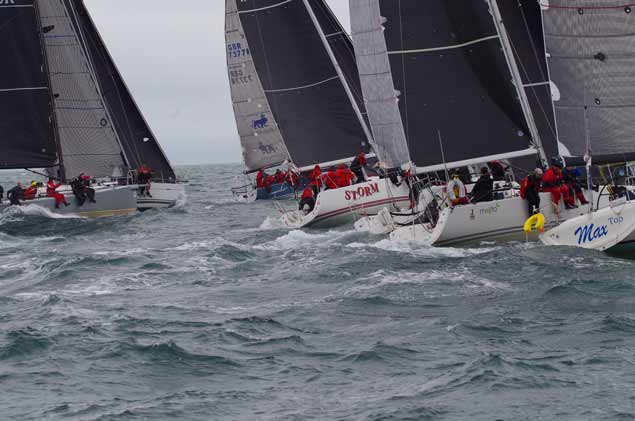 An IRC 1 start at the Welsh Championships
An IRC 1 start at the Welsh Championships
Saturday's forecasts was for 15-20 kts and with much heavier winds forecast for Sunday there was talk of trying to fit in extra racing, but the fleet were quickly met with 21 kts as soon as they left the channel and it soon build to 25-28 kts.
The sustained wind and building chop proved challenging for the fleet with “Valkyrie” losing their pulpit, Dun Laoghaire based ISORA boat “Yoyo” with an injury onboard and “Storm” breaking their spinnaker pole - but despite their difficulties, “Storm” took all three races in IRC 1 to lead the series, with “Checkmate” again taking two wins in IRC 2. 1720 “Mayhem” took both wins in IRC 3 and Darling XX IRC 4 Cruiser Class
Competitors were greeted by the Jac Dobson a’r band playing in Plas Heli after racing, with impressive dancing by the “Max Too” team! with today’s prizing draw and jugs of beers sponsored by Firmhelm. This was followed by a crew dinner, in Plas Heli’s Gorwel restaurant.
Sunday soon found the overnight gale “Ernesto” subside and winds soon dropped off to 17kts for the start of racing, further dropping to 6-8kts by the end of the last race. With the chop left from the previous night's winds, the fleet experienced equally challenging conditions.
In IRC 1 “Storm” one of three highly competitive RC35 class racing in the event managed another convincing day with two firsts and a third to win the overall class 1, and take the inaugural Celtic Cup with wins here at Pwllheli Wales, the Scottish Series at Tarbert back in May, a second at the Bangor town regatta, and first at the Kip Regatta. IRC2 was won by Impala 28 “Checkmate”, IRC3 class was by Cork 1720 “Mayhem” and IRC 4 Cruisers by DarlingXX
A great three-day championship, with race management by Clwb Hwylio Pwllheli Sailing Club and Royal Dee Yacht Club, and social events by Plas Heli, who thank all helpers and competitors, with a special mention to the RC35 class, and all Irish and Liverpool boats for making the journey to Pwllheli.
Results here
Entries are still invited for the IRC Welsh National Championships in Pwllheli from 17th-19th August 2018, just a few days after the ICRA Nationals in Galway.
This flagship event is being hosted by Plas Heli, the Welsh National Sailing Academy and Events Centre, and managed by Clwb Hwylio Pwllheli Sailing Club and Royal Dee Yacht club.
Racing is planned for two IRC classes and a cruiser class on two racetracks, in a commercial traffic free environment. Cardigan Bay has weak tides and provides a safe and fair racing area, for windward/leeward, coastal or round the cans racing, with stunning views of Snowdonia and the Llyn peninsula as a backdrop.
Free berthing is available on the Welsh National Sailing Academy's event pontoons, and included in the entry fee, which for those entering before August 7th includes an entry into a prize draw with some useful prizes!
Organisers say they are delighted to host the RC35 class who have included the event as part of the Celtic Cup, with notable boats “Storm” “Triple Elf” and “Imposter” already entered. Pat Kelly's Storm has already sailed to early season success at the Scottish Series in May and was also victorious at Bangor Town Regatta too.
With an ISORA race from Dun Laoghaire to Pwllheli the weekend before, its a great opportunity for ISORA boats, particularly those based in Ireland to enter the regatta, and join “Mojito" “Sgrech" “Jackknife" and “YoYo" that have already done so.
Locally, “Legless Again” “Bada Bing” and “Honey Bee” look set to battle in IRC 2 once again. Sportsboats are embedded in the two IRC classes this year but also compete for the Sportsboat cup, with the well travelled and 2017 Dun Laoghaire Regatta winning 1720 “Luvvly Jubbly” head to head with “Mayhem".
In the Cruiser class, 2017 IRC 4 champ “Ella Trout 3” joins a growing list of local boats in this popular class, racing one short coastal race per day, around local islands and marks.
Enter here


























